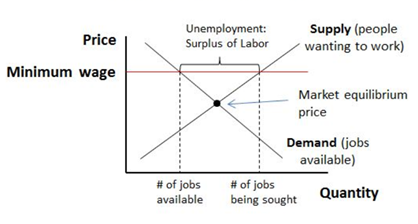In the debate over minimum wage, people often become distracted by their inner altruism and ignore the logic behind the economic laws that govern labour markets and the macroeconomy of South Africa. “People should be able to access healthcare and higher education”. “People should be able to earn a living wage”. The problem with these normative statements is that merely subscribing to them provides little insight into the mechanisms by which these things could be achieved. Simply put, economic growth and the development of a skilled workforce are the keys to raising wages, not further regulation. Advocates for regulation typically jump straight from “People should be able to earn a living wage” to “We should raise the minimum wage in South Africa”. However, there are economic forces at play that make this seemingly straight-line thinking look more like a highway through the Drakensberg mountains. As beautiful as the destination may be, ignoring these paths will surely make South Africans road sick before they ever get there.
Advocates argue that raising the minimum wage would help poorer citizens provide for their families and lift them out of poverty. It is true that minimum wage regulations typically only apply to poorer, lower-skilled workers. It is not true that raising the minimum wage will help them. The money that companies use to pay higher wages would reduce profit margins, which are often slimmer than we realise. Maintaining profit margins is a serious pursuit for firms because profits allow firms to innovate, expand, and stay alive in a competitive market. When confronted with a mandatory minimum wage, companies often must increase the prices of their goods or services to preserve profit margins and thereby ensure their continued existence. Therefore, broadly raising the minimum wage would increase consumer prices, that is, inflation.
Inflation, unfortunately, hurts the poor far worse than it hurts anyone else. The poor are more likely to live pay cheque to pay cheque and inflation means that prices would rise. Prices would certainly rise much faster than wages will adjust – especially a minimum wage set by the government. This means that the poor are able to buy less of what they need to survive as inflation rises. What good are higher wages if purchasing power falls? Thus, the very people who were supposed to benefit from an increase in the minimum wage are the ones who are most hurt by the ripple effects of this policy. This seemingly progressive price floor set by the government then turns into a very real regressive consequence for the poor.
Secondly, let me say that raising the national minimum wage does not increase GDP. If it did, you would no longer be able to see a “minimum” wage at all, because every country in the world would be continuously raising this minimum in an effort to stimulate economic growth. We have all heard the claims that a higher minimum wage would benefit the economy by giving workers more money to spend, thereby increasing aggregate demand and South Africa’s GDP. Raising the minimum wage does not increase aggregate demand at all, because any extra money paid to workers would have merely come from the firms or consumers in the form of higher prices. Either way, this money already existed in the economy and would have been spent no matter what. Add inflation to the mix, and South Africa’s RGDP, which is the GDP corrected for changes in prices, would fall.
Finally, raising the minimum wage would put a strain on South Africa’s already thin labour market. By the laws of supply and demand in the labour market, settling a wage above the natural market wage will cause some people to be forced to work fewer hours or lose their jobs.

*Photo from Edgeworth Economics
The wage workers should be paid, the natural market wage, is the equilibrium price for labour as determined by competitive forces in the labour market. It is true that labour markets in different industries will respond somewhat differently to changes in wages. However, economists agree that the above model shows the consequences in standard labour markets where minimum wage workers are most likely found. Simply speaking, as labour becomes more expensive, companies are more likely to substitute technology for workers, more likely to hire fewer workers for longer hours, more likely to offer fewer benefits, and/or limit training in an effort to control other costs associated with labour. It is also worth noting that the workers most at risk of being let go or having their hours reduced are lower-skilled workers. At risk of becoming public enemy number one, I am inclined to argue that the wage lower-skilled workers are already getting is better than no wage at all.
Instead of focusing on raising the minimum wage, government officials’ time would be better spent improving the structural problems in South Africa that have caused the market equilibrium wage to be so low: poor education and training, low population mobility, and regulations on investment and innovation. As the economy grows, so too will wages. I did not study economic development to abandon the interests of the poor and disadvantaged. On the contrary, I became an economist to examine the source of the economic hardships that trap so many people around the world in poverty and help find remedies. Raising the minimum wage is not a remedy, not a solution. Low wages are a symptom of larger sicknesses in the South African labour market.
Author Jessica Canada Wellman has an MA in Applied Economics and is a Fulbright Scholar at the Free Market Foundation. This article may be republished without prior consent but with acknowledgement to the author. The views expressed in the article are the author’s and are not necessarily shared by the members of the Free Market Foundation.